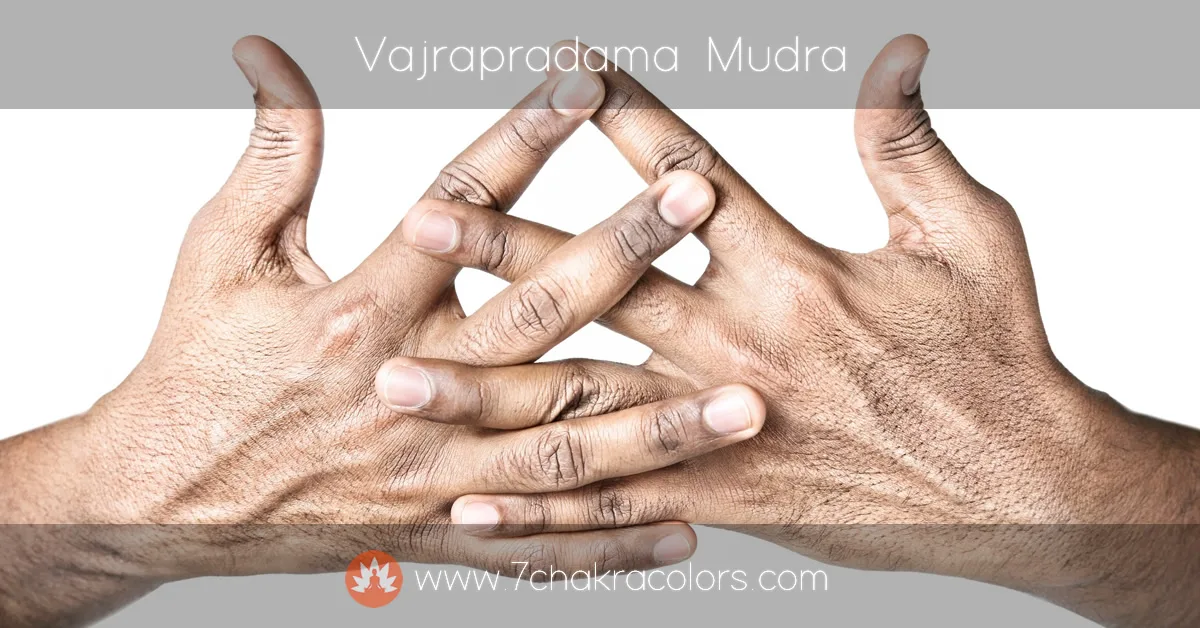

Vajrapradama Mudra, the “Gesture of Unshakable Trust,” cultivates inner strength, resilience, and confidence. This empowering hand gesture fosters self-trust, emotional stability, and deep faith in life’s path. By activating the Heart Chakra, Vajrapradama Mudra nurtures love, courage, and unwavering belief in oneself.
Vajrapradama Mudra is known as the "Gesture of Unshakable Trust." This hand gesture represents unbreakable faith in oneself and the universe. It is a powerful mudra often used to cultivate inner strength, resilience, and self-confidence, especially during times of uncertainty or emotional upheaval. The mudra encourages practitioners to trust their inner wisdom and believe in their inherent abilities.
The word "Vajra" means thunderbolt or diamond, symbolizing strength and indestructibility, while "Pradama" signifies trust or faith. Together, Vajrapradama Mudra embodies the deep-rooted belief that we have the strength to face any challenge life may present, with unshakable faith in our path.
Check out the complete list of mudras here.
To practice Vajrapradama Mudra, sit comfortably in a meditative posture such as Sukhasana (Easy Pose) or any seated position that allows for a straight spine and open chest. Cross your hands over your heart center, with the fingers gently interlacing. Your palms should face toward your body, and the elbows can be relaxed.
Close your eyes and take a few deep breaths, allowing yourself to focus on the warmth and protection of your own embrace. As you hold this position, feel the sensation of support radiating from your heart center, reminding you of the inner strength that resides within.
Vajrapradama Mudra offers numerous emotional and mental benefits, particularly in helping to rebuild self-confidence and trust. It is an excellent mudra for overcoming self-doubt, fear, and feelings of insecurity. The gesture fosters a deep sense of self-assurance, allowing you to reconnect with your inner source of power and stability.
Additionally, this mudra can be incredibly comforting in times of emotional stress or difficulty, acting as a reminder of the resilience and strength we all possess. It helps to cultivate a calm, grounded state of mind, reducing anxiety and promoting a sense of safety and inner peace.
Vajrapradama Mudra can be practiced during meditation or whenever you need to reconnect with a sense of trust in yourself and the universe. It is especially useful in times of uncertainty, stress, or when dealing with self-doubt. This mudra can also be used before important decisions or transitions, allowing you to center yourself and draw on your inner strength.
You can practice Vajrapradama Mudra daily, incorporating it into your morning or evening meditation routines. You can also practice it in moments of stress or tension when you need to ground yourself and restore your confidence. Holding this mudra for several minutes while focusing on your breath can help realign your thoughts and emotions with a more empowered mindset.
Vajrapradama Mudra carries deep symbolic meaning in yogic and meditative traditions. The crossing of the hands over the heart center signifies a protective, nurturing gesture, symbolizing the trust and confidence we place in ourselves. The interlacing fingers represent unity and strength, indicating that we are whole and complete within ourselves, capable of overcoming any adversity.
This mudra also serves as a reminder of the "Vajra" quality—invincible and indestructible, much like the qualities of the human spirit. By practicing this gesture, you invoke a sense of unwavering faith in your path and your ability to handle life’s challenges with grace and resilience.
Vajrapradama Mudra is closely linked to the Heart Chakra (Anahata), which governs love, compassion, and trust. By crossing the hands over the heart, this mudra helps to open and balance the Heart Chakra, allowing for the release of fear and insecurity and making space for unconditional love and trust to flow.
This mudra also promotes healing in the emotional body, helping to resolve past traumas or disappointments that may have affected your ability to trust yourself or others. Regular practice can deepen your sense of emotional balance and harmony, fostering inner peace and connection with your true self.